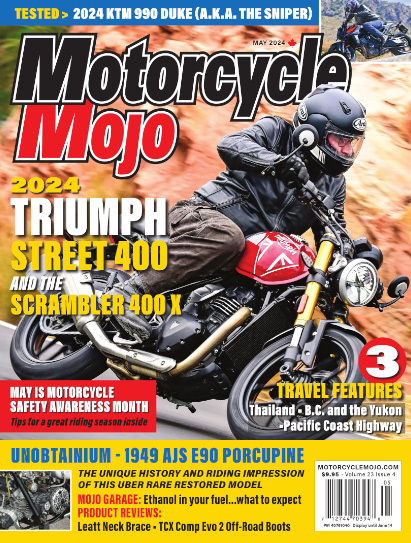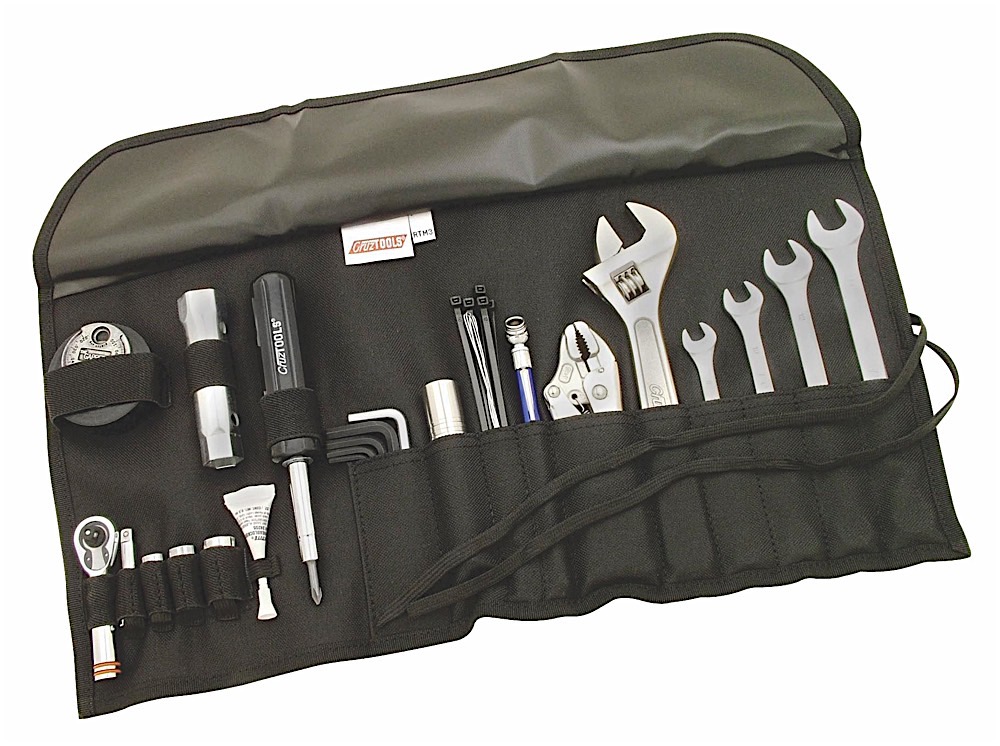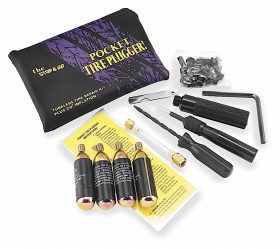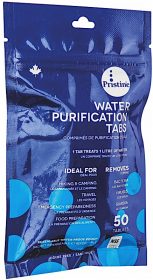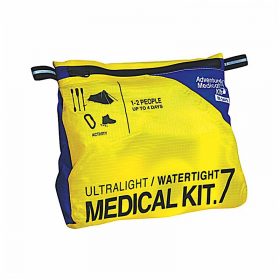Bringing a few basics on your adventure can sometimes make or break your level of enjoyment.
In keeping with this issue’s theme of travelling abroad, I’m recommending you still prepare for roadside emergencies even when you are part of a guided tour and regardless of whether the company you’ve chosen provides a chase truck and mechanics. Some tours allow you to ride on your own, or you might lose the group and end up on your own anyway, so you should be ready to deal with a minor mechanical problem or a minor spill.
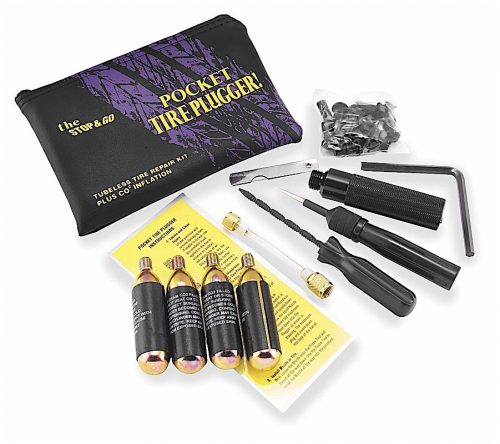 Bring the minimal number of tools to get out of a jam if needed. Get familiar with the motorcycle you’ll be riding ahead of time and find out if you’ll need some special tools to perform simple tasks. If you’ve chosen to ride a BMW, for example, you’ll need some Torx bits to adjust the controls. And you should make minor adjustments to hand levers and the shift lever on the bike; you will, after all, likely be logging a couple of thousand kilometres on it.
Bring the minimal number of tools to get out of a jam if needed. Get familiar with the motorcycle you’ll be riding ahead of time and find out if you’ll need some special tools to perform simple tasks. If you’ve chosen to ride a BMW, for example, you’ll need some Torx bits to adjust the controls. And you should make minor adjustments to hand levers and the shift lever on the bike; you will, after all, likely be logging a couple of thousand kilometres on it.
You need not bring an entire toolbox, but carry Allen wrenches, the necessary screwdrivers, just a couple of combination wrenches in popular sizes, a small adjustable wrench, small locking pliers, a pencil-type air pressure gauge, some duct tape, a flashlight and zip ties. These will fit easily into a small tool pouch, which takes up minimal space in a saddlebag.
If the tires are tubeless, carry a tire repair kit, such as the Stop & Go CO2 tire repair kit ($58), which includes tire plugs and their related tools, pressurized cartridges and even hand cleaner. A kit like this will get you back on the road in minutes, instead of you having to wait for a chase truck to repair a simple flat tire.
Paper maps are a necessity, and will likely be handed out by the tour company, but dealing with road signs in foreign languages can prove challenging. This is why, if you own a GPS, you should buy the appropriate mapping software for the area you’ll be visiting and bring it along. This will prove indispensable should you get lost, and depending on the type of device, it can also track your route as you ride it for future reference. Don’t forget to bring an easily installed GPS mount, which you can attach to your bike with the tools you brought along.
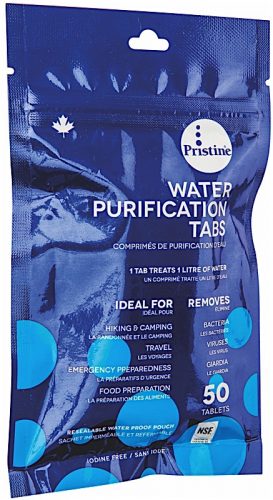 Bring your cellphone. Ideally, you should bring an unlocked smartphone, because in many foreign countries, you can buy preloaded talk and data SIM cards, which are much less expensive than using your home plan abroad – but only work in unlocked phones. Aside from being able to make calls, with a data plan, you can use your smartphone as a GPS, or at least find your way around using Google Maps should you get lost and have no GPS unit handy.
Bring your cellphone. Ideally, you should bring an unlocked smartphone, because in many foreign countries, you can buy preloaded talk and data SIM cards, which are much less expensive than using your home plan abroad – but only work in unlocked phones. Aside from being able to make calls, with a data plan, you can use your smartphone as a GPS, or at least find your way around using Google Maps should you get lost and have no GPS unit handy.
You can find these SIM cards at many airports, or in convenience stores, but you should search online for the best deals in the country you’ll be visiting. There are Canadian carriers that have affordable travel plans. I use Rogers, which has a Roam Like Home program that allows me to use my home plan for $5 a day in the U.S. and $10 a day overseas. Preloaded SIM cards bought abroad, however, can cost much less than this plan and are a better solution if you are staying more than a few days.
You should also be prepared for minor injuries. Even though you might not have fallen off your bike, maybe you skinned a finger trying to tie down a piece of luggage. A medical kit like the Klim Ultralight Watertight first aid kit ($40) includes all the items you’ll need to deal with minor cuts, scrapes and burns. Also bring hand sanitizer and wet wipes (I call the latter “shower in a bag,” for obvious reasons), because proper toilets are not always available.
If you’re travelling to countries where water quality is questionable, bring some water purification tablets; brands include Aquatabs and Pristine, and they cost between $10 and $20 for a pack. These products treat water against bacteria and viruses, and are a must when visiting some countries.
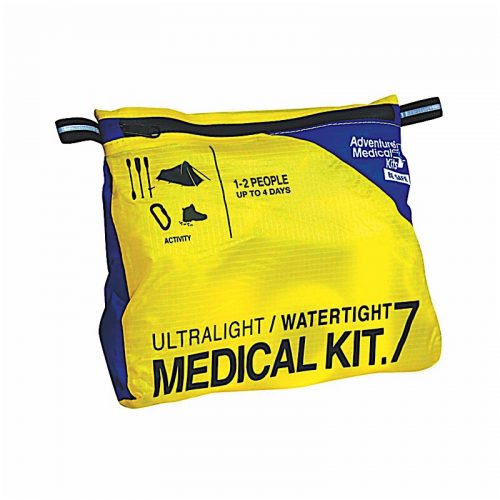 Also make sure your shots are up to date, and inquire which vaccinations may be necessary for the countries you’ll be visiting. For example, during a trip to South Africa in 2010 that included visits to Mozambique and Swaziland, it was highly recommended that I get vaccinated against hepatitis A and B, and I had to bring tablets that guarded against malaria. These preventive measures cost $95 and proved well worth the money. You can find out what vaccines are needed in which countries at travel.gc.ca.
Also make sure your shots are up to date, and inquire which vaccinations may be necessary for the countries you’ll be visiting. For example, during a trip to South Africa in 2010 that included visits to Mozambique and Swaziland, it was highly recommended that I get vaccinated against hepatitis A and B, and I had to bring tablets that guarded against malaria. These preventive measures cost $95 and proved well worth the money. You can find out what vaccines are needed in which countries at travel.gc.ca.
Finally, carry dry snacks and liquids. Powdered Gatorade mix is a good source of energy and hydration when travelling to hot countries. And keep in mind, when travelling, you’re not always guaranteed timely meals, so it’s reassuring to have something to eat if you’re stranded, or just have a craving that needs fulfilling.
Technical articles are written purely as reference only and your motorcycle may require different procedures. You should be mechanically inclined to carry out your own maintenance and we recommend you contact your mechanic prior to performing any type of work on your bike.







